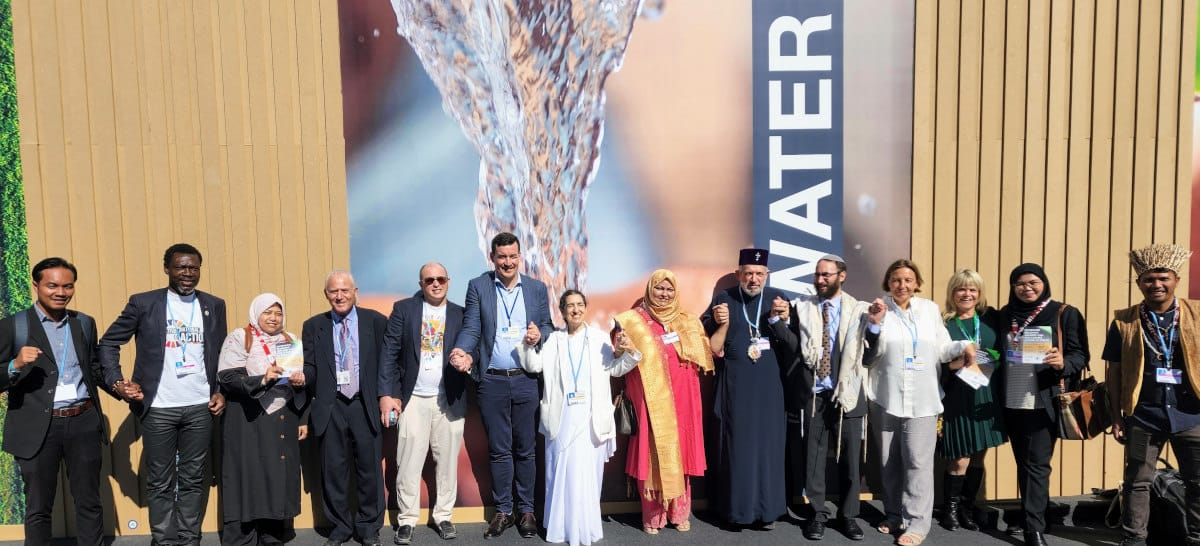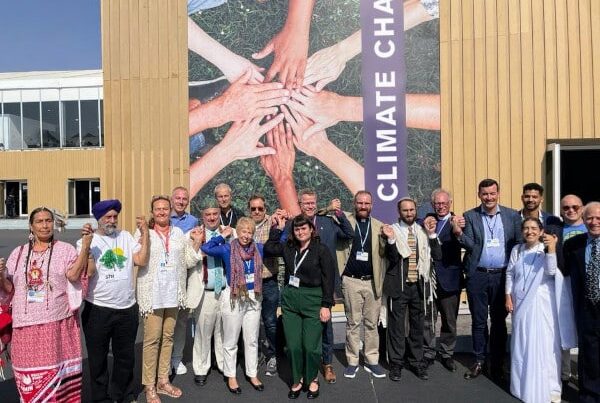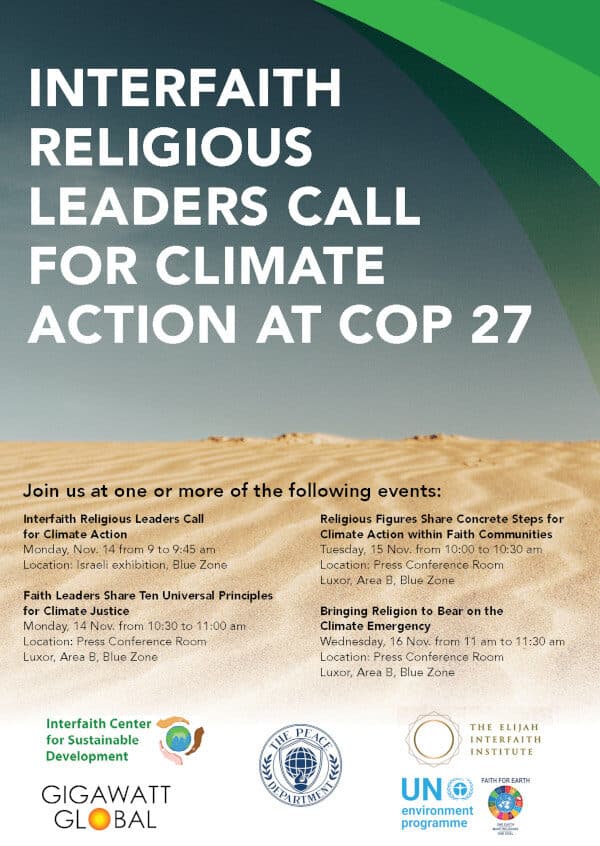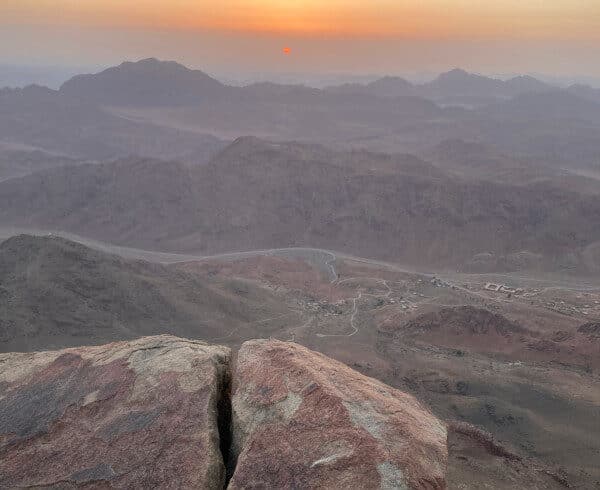
Multifaith Events at the COP 27 UN Climate Conference in Egypt
Between November 6th and 18th, 2022, the UN climate conference COP 27 took place place on the Sinai Peninsula, in Sharm El Sheikh, Egypt. Religious communities and religious leaders have a key role to play in addressing climate change and climate justice, which requires deep transformation within society. The knowledge of what changes are critically needed to diminish long-term harm to the planet is readily available. However, bringing about change in action demands deeper changes in attitude, a change of heart. This has been the domain of religions for millennia. Religions are sources of inspiration for the transformation of heart and the ensuing changes of attitude.
To support, challenge and inspire discussions during COP 27 at Sharm El Sheikh, ten interfaith climate events took place in Sharm El Sheik, Jerusalem, London, Rishikesh (India) and elsewhere that were heart-stirring, transformative and a moment of inspiration for religious communities and for humanity. Religious leaders called for a reexamination of deep-seated attitudes and for identifying ways to transform these attitudes for the wellbeing of Earth, our common home.
Mount Sinai is a mountain whose memory and meaning loom large as a place of revelation in the collective consciousness of Christianity, Judaism, Islam and others. As an ancient sacred space, it was the site of prophetic experience, and receiving God’s message, for the prophets Moses and Elijah in all three Abrahamic traditions, and the prophet Muhammed in the Muslim tradition. COP 27 taking place in Sinai reminded humanity of our sacred responsibility to care for God’s creation (Find out about COP28 here).
We come to Sinai in a movement of repentance and quest. We seek a new vision for humanity and its endangered existence, and we seek to receive and amplify a message of life-sustaining living and habits that humanity needs to hear today. In this spirit, the project partners brought together premier religious leaders from the world’s major religions to put forth a prophetic interreligious call to action: “Ten Universal Principles for Climate Justice.”
We are not seeking to create one religion, but rather to bring religious institutions from many different faiths together in joint action for protecting God’s creation.


Preaching and Teaching on Climate Change
As world leaders and climate activists meet in November for the U.N.’s COP27, preachers and congregations can add their voices to the calls for climate justice.
In an effort to encourage clergy to teach and preach on climate change, we have made available the following free resources:
- Abraham and Torah teachings on Climate Change
- COP27 – Solidarity And Endurance For Climate Justice: Malachi 4 And Luke 21
- For materials on Islam and climate change, click here.
- For materials on Hinduism and climate change, click here.
Interfaith Climate Events at COP 27
The Interfaith Center for Sustainable Development (ICSD), together with partners, organized four multifaith climate events at COP 27, including in the press conference space in the Blue Zone. The events incorporated concrete examples of how religious communities are actively meeting the climate challenge, and featured concrete initiatives that translate the broader spiritual practices into action.
The Sinai Climate Call received media coverage in hundreds of media outlets, reaching millions of people.
The titles of the four sessions were:
- Interfaith Religious Figures Call for Climate Action
- Religious Figures Share Concrete Steps for Climate Action Within Faith Communities
- Faith Leaders Share Ten Universal Principles for Climate Justice.
- Bringing Religion to Bear on the Climate Emergency.
Speakers were His Excellency Metropolitan Serafim Kykotis, vice president of the Pan Africa Council of Churches; Bishop Andreas Holmberg of the Stockholm Diocese of the Church of Sweden; James Sternlicht, founder and CEO of Peace Department; Gloria Ushigua, director of the Association of Sapara Women; Rev. Susan Hendershot, president of Interfaith Power and Light; Rabbi Yonatan Neril, founding director of the Interfaith Center for Sustainable Development; Fr. Eduardo Agosto of the Laudato Si’ Movement; Nigel Savage, founder and global ambassador of Hazon; ; Dr. Fachruddin Majeri Mangunjaya, Chairman, Centre for Islamic Studies, Universitas Nasional, Jakarta; Imam Saffet Catovic of Islamic society of North America; Matthias Boehning of the World Evangelical Alliance; Sr. Maureen Goodman and Valeriane Bernard of Brahma Kumaris; climate scientist Paul Beckwith; and Regina Valdez of the Center for Sustainable Development at Columbia University. David Miron Wapner, chair of the Interfaith Center for Sustainable Development, moderated the sessions.
Follow Up and Outreach:
Learn more about the Sinai Climate Partnership for Houses of Worship
Founding Partners: The event will be coordinated by a coalition of organizations:
- The Elijah Interfaith Institute and its Board of World Religious Leaders brings together some of the world’s most prominent religious figures from Judaism, Islam, Christianity, Buddhism and the Religions of India. The London climate repentance ceremony involved world religious leaders, primarily from the Elijah Board of World Religious Leaders.
- The Interfaith Center for Sustainable Development reveals the connection between religion and ecology and mobilizes people to act.
- The Peace Department is a US non-profit designed to solve global coordination failures by making philanthropy and impact investing effective and scalable.
- Climate activist Yosef Abramowitz serves as special advisor to the initiative.



Other Partners: The UN Environment Program’s Faith for Earth Initiative works to strategically engage with faith-based organizations and partner with them to collectively achieve the Sustainable Development Goals (SDG) and fulfill the objectives of the 2030 Agenda.
Goals of the Interfaith Climate Events
- Inspire and unleash the power of religions, religious leaders and faith communities as change agents for climate action and as sources for inspiring and motivating discussions among politicians and civil bodies.
- Motivate action among religious communities and the wider public to curb climate change.
- Invite media to cover religious leaders’ advocacy in combating climate change.
- Promote a coalition of religious leaders to work together for climate action.
- Generate new faith-inspired climate education materials for broad use.











